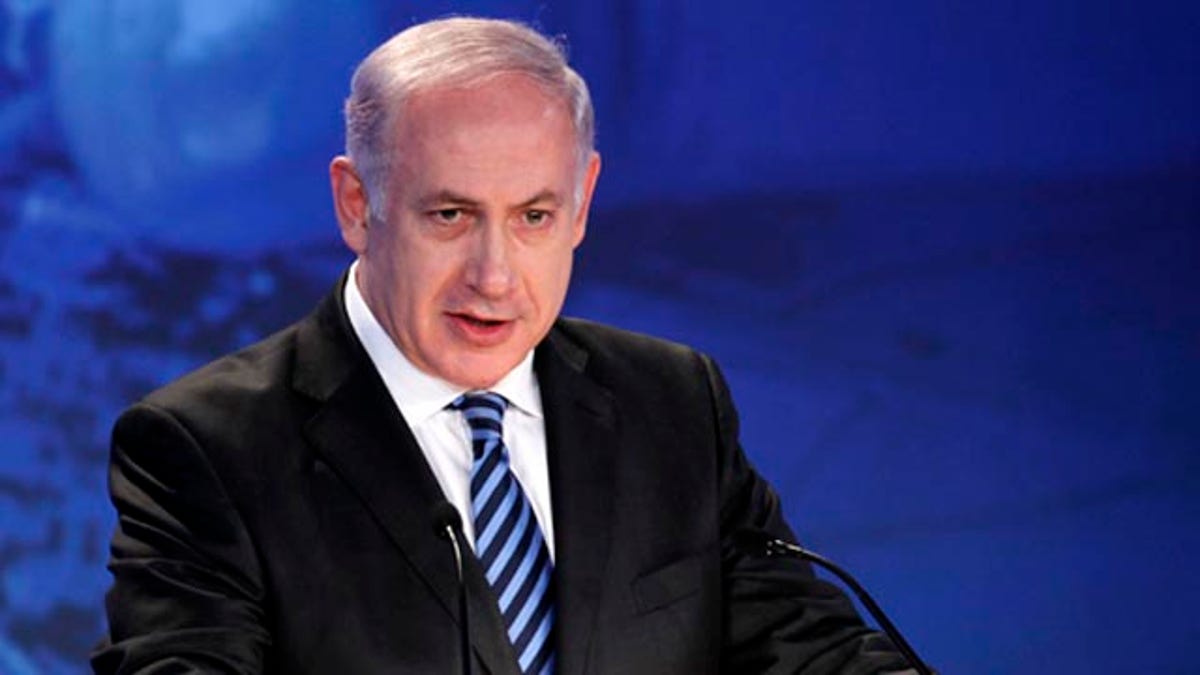
Israeli Prime Minister Benjamin Netanyahu, shown here at the annual General Assembly of the Jewish Federations of North America in New Orleans, defends construction in east Jerusalem. (AP)
JERUSALEM -- Israel on Tuesday hotly defended its new construction plans for disputed east Jerusalem against criticism from President Barack Obama, Palestinians and the European Union -- insisting it never agreed to halt the building and sharpening a crisis that threatens to derail peace talks.
A harsh statement from Prime Minister Benjamin Netanyahu's office insisted that "Jerusalem is not a settlement. It is the capital of the state of Israel."
It continued: "Israel sees no link between the peace process and its development plans in Jerusalem."
The statement followed denunciations of a plan to build 1,300 apartments in Jewish neighborhoods in east Jerusalem, which the Palestinians regard as illegal settlements.
Palestinians claim east Jerusalem, captured by Israel in the 1967 Mideast War, as the capital of their future state. The international community has not recognized Israel's annexation of the city's eastern sector.
The latest flare-up in the settlement issue has underlined its potential to scuttle U.S. efforts to broker a peace accord. Palestinians see the settlements as a threat to their hopes for a state that would encompass West Bank, Gaza Strip and east Jerusalem, and charge that the continued construction is solidifying Israel's presence there. Settlers say openly that their goal is to prevent creation of a Palestinian state.
Palestinians have said they will not resume peace talks, restarted at the White House in September, unless Israel halts construction in the West Bank and east Jerusalem, reinforcing their demand that Israel renew a 10-month West Bank settlement slowdown that expired in September -- and add Jerusalem to it.
The Israeli statement Tuesday hotly rejected that.
"Israel has never taken upon itself limits on construction in Jerusalem," it said, "including during the 10-month building suspension in Judea and Samaria," biblical terms for the West Bank.
On Tuesday, Obama added his voice to the criticism of the latest building plan, calling it unhelpful to the pursuit of peace. Obama spoke during a tour of Indonesia.
EU's foreign policy chief, Catherine Ashton, also condemned the plan, saying in a statement on Tuesday that it "contradicts the efforts by the international community to resume direct negotiations and the decision should be reversed."
Palestinians accuse Netanyahu, who is currently visiting the U.S., of choosing settlements over peace.
In a statement, settler leaders accused Obama of "hypocrisy," adding that his criticism showed he is "out of touch with the reality of facts on the ground."
In Indonesia, Obama expressed concern that Israelis and Palestinians are not making the "extra effort" to secure a peace breakthrough.
He said he has not seen the kind of progress in negotiations that "could finally create a framework for a secure Israel living side by side in peace with a sovereign Palestine."
Netanyahu, who made his career as a settlement-backing hard-liner, last year for the first time endorsed the idea of a Palestinian state and said recently that drawing borders would solve the settlement problem -- implying that he would agree to removing settlements that fall within the territory of a Palestinian state.
Palestinians mistrust Netanyahu because of his past record and because his coalition government includes intransigent backers of the settlements and opponents of giving up control of the West Bank.
There is even speculation that Israel's Interior Ministry, controlled by the pro-settlement ultra-Orthodox Jewish Shas Party, timed the latest step in the construction plan to coincide with Netanyahu's trip to the U.S.
Interior Ministry officials deny the link.
The Interior Ministry said it released the construction plans because the law requires that the public can examine them and file objections. Spokeswoman Efrat Orbach said it would take years before building would begin, if at all.
About 200,000 Israelis live in neighborhoods surrounding the Palestinian sections of east Jerusalem. The new construction is slated for three of those neighborhoods, without expanding their boundaries.
Also Tuesday, Israeli settlers from Maskiot in the Jordan River valley set up a fence just outside their community. Angry Palestinians called it a land grab.
Avinadav Vitcom, a Maskiot spokesman, said they put up the fence as a temporary measure to keep out Bedouin nomads who set up camp on state land near the settlement.
Vitcom later said the fence would be taken down in accordance with a request from the military.







































